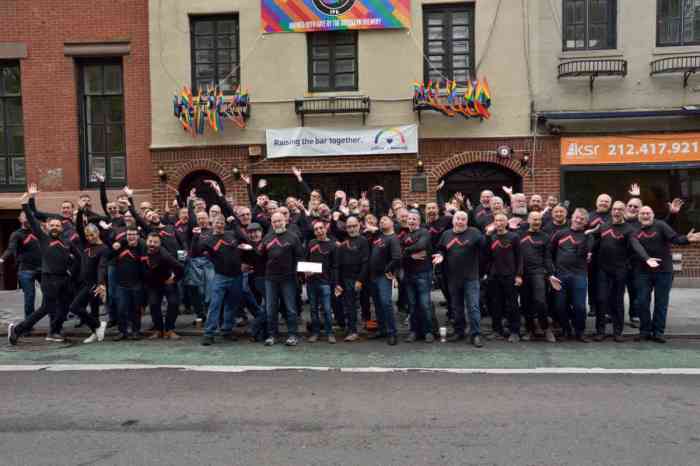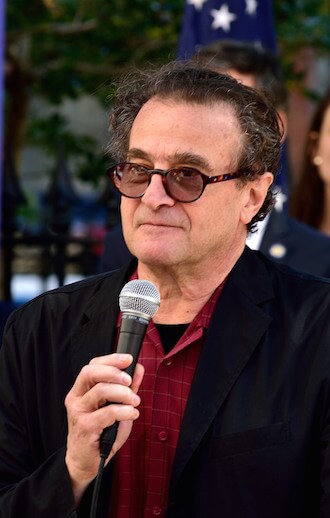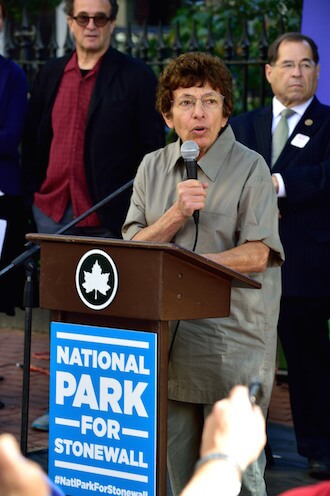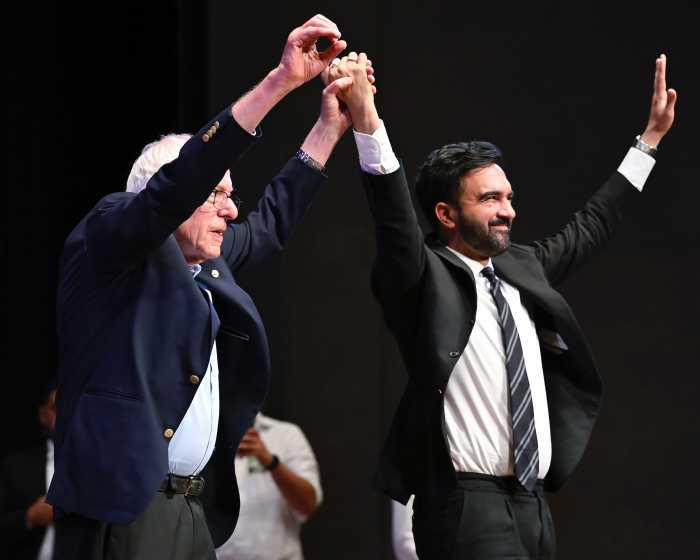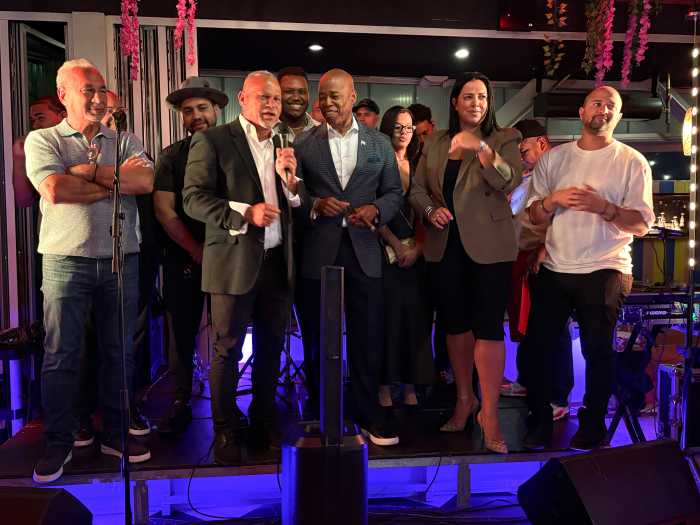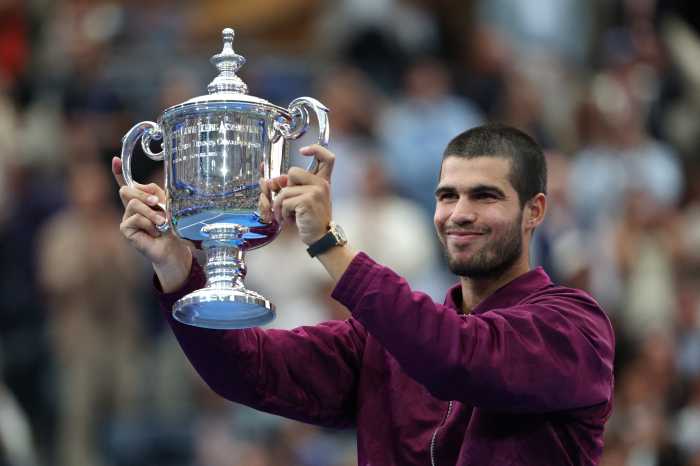In 2015, the LGBT films that received the most attention ranged from the sublime to ridiculous. On the plus side, there was “Carol,” out filmmaker Todd Haynes’ outstanding adaptation of Patricia Highsmith’s novel, “The Price of Salt,” about lesbian desire in the 1950s. The film was another unqualified success for Haynes, and actresses Rooney Mara and Cate Blanchett were indelible as the lovers.
Another breakout hit was “Tangerine,” Sean Baker’s funky little comedy, shot entirely on an iPhone. The film featured two motor-mouthed transgender prostitutes Sin-dee (Kitana Kiki Rodriguez) and Alexandra (Mya Taylor) wandering around Los Angeles on Christmas Eve. The film thrived on its characters’ manic energy, and it had tremendous heart.
However, on the negative side, gay filmmaker Roland Emmerich’s “Stonewall” got a stoning from critics, who found the film cringe-inducing. Even before its release, “Stonewall” was criticized for “whitewashing,” having a fictional white male hero as the central character in a story that should be about the many transgender activists, drag queens, and queer people of color who fomented social change. Perhaps because of boycotts or simply bad reviews, audiences stayed away in droves. The film averaged $875 per screen on opening weekend, and closed in 21 days.
Bisexuality, blurring sexuality’s lines prominent, while gay male fiction films sagged
There were highs and lows this year for out actors. Lily Tomlin earned raves for her performance as the title character in “Grandma,” a tough talking lesbian feminist who helps her granddaughter (Julia Garner) procure an abortion. Tomlin’s feistiness was the film’s biggest asset, and generated much of the film’s humor.
In contrast, out actress Ellen Page’s passion project, “Freeheld” was met with a lukewarm reception, both critically and commercially. Page co-starred with newly-minted Oscar winner Julianne Moore as Stacie Andree and Laurel Hester, the lesbian couple who fought for domestic partner pension benefits when Laurel, a county police lieutenant, developed terminal cancer. The film was best in its tender scenes between the lovers, but lacked emotional pull in its grandstanding moments.
One of the best lesbian films of the year was Peter Strickland’s sensual “The Duke of Burgundy,” a distinctive, ecstatic, and arch romantic drama about lesbian lepidopterists who practice S&M.
Besides “Tangerine,” films that led with transgender characters this year included Eric Shaeffer’s romantic roundelay, “Boy Meets Girl,” about Ricky (Michelle Hendley), a transitioning teen, and her friends; the fine Australian drama “52 Tuesdays,” from Sophie Hyde, about a teenager’s (Tilda Cobham-Hervey) relationship with her gender transitioning mother (Del Herbert-Jane); and “The Danish Girl,” Tom Hooper’s handsomely mounted but impassive film featuring Oscar-winner Eddie Redmayne, as the transgender pioneer Lili Elbe.
Gay filmmaker François Ozon teased out a tale of transvestism in his fabulous comedy-drama “The New Girlfriend” about a cross-dresser (Romain Duris) whose secret is discovered by his late wife’s best friend.
Gay men had a rough year at the movies, at least as fictional stories went. In “Legend,” Tom Hardy had a terrific dual role as the Kray twins, and yet the sexuality of the gay brother, Ronnie, was largely unexplored despite some frank discussions of his sexual interests. Robin Williams’ final starring role, as a sexually repressed gay man in the dull and obvious “Boulevard” felt contrived, rather than poignant. And while the biopic “Saint Laurent” looked as fabulous as star Gaspar Ulliel, the overlong film was all style, no substance.
Bisexuals possibly had their best on screen in 2015. Desiree Akhavan’s “Appropriate Behavior” was a hilarious deadpan comedy about looking for love, having sex, and failing to connect with anyone. It was an auspicious feature debut. Likewise, the naughty couples in the adult sleepover film, “The Overnight,” were testing their boundaries with some same-sex seductions — when not participating in an unforgettable nude scene. Also exploring their queer sides were Matthew Broderick’s milquetoast character in Neil LaBute’s caustic “Dirty Weekend,” and Jack Black, whose bromance with James Marsden in Jarrad Paul and Andrew Mogel’s underrated and underseen film “The D Train” was both unsettling and fascinating.
One of the best queer non-fiction films this year was Robert Gordon and Morgan Neville’s divine comedy “The Best of Enemies” about debaters Gore Vidal and William F. Buckley, Jr. Less impressive was the middling comedy, “Do I Sound Gay?” where filmmaker David Thorpe talked out of both sides of his mouth as he explores the vocal stereotypes of gay men.
There were two terrific docs about gay men and hoaxes this year. “An Honest Liar,” chronicled James “The Amazing” Randi, a skeptical magician who came out at 81 and spent his life debunking fake psychics and the like, only to be involved in a real-world deception. “The Yes Men Are Revolting,” featured the openly gay Andy Bichlbaum worrying that his activist work (with his business partner Mike Bonanno) staging pranks against corporations will prevent him from settling down with a romantic partner.
“Dior and I” was a fashionable doc by out filmmaker Frédéric Tcheng, a gorgeous portrait of as he took the helm of the Parisian haute couture house. “Tab Hunter Confidential,” adapting the actor’s eponymous book, was also enjoyable, exploring his closeted days in Hollywood and the happiness he found in his off-screen relationships with men, including Tony Perkins.
Gay actors starred in some rather mediocre films this year. Queer icon Ian McKellen had a big indie film hit, as the literary sleuth in out director Bill Condon’s “Mr. Holmes,” but the film itself was mysteriously underwhelming. And while “Magic Mike XXL” didn’t take off at the box office (earning about half of what the first male stripper film made), gay actor Matt Bomer looked good taking it off. Alas, his Ken-doll character was a skin-deep as the film.
Some of the hottest nude and sex scenes in cinemas featured queer couplings. Gaspar Noé’s audacious “Love,” shot in glorious 3-D, featured a threesome with Karl Glusman (of “Stonewall”) and his coming-at-you penis, and his female co-stars Aomi Muyock and Klara Kristin. There was also an awkward encounter with a trans character. “Love” wasn’t for all tastes, but it was — ahem, in some respects — impressive. “Future Beach” by out filmmaker Karim Aïnouz, was a superb drama about two men who bond when one’s friend drowns. The film featured an elliptical narrative, raw emotion, and plenty of sex and skin.
Arguably, the best films of the year had queer twists. The outstanding French entry “Eastern Boys” started out like a sex film about a Ukrainian hustler, but it become a tense and touching love story. Director /writer Robin Campillo’s film was a quietly powerful drama about exploited illegal immigrants.
Writer/ director/star Sebastián Silva’s “Nasty Baby” took an unexpected (and for some, unappreciated) narrative turn when an interracial gay couple (Silva and Tunde Adebimpe) helping their friend Polly (Kristen Wiig) have a baby, got involved in something quite sinister. “Nasty Baby” may have left a bad taste in viewers’ mouths, but it was memorable.
Finally, one of the most enjoyable queer-themed films this year was writer/ director/ star Lawrence Michael Levine’s delicious farce “Wild Canaries.” Levine and his real-life wife Sophia Takal co-starred as a couple, who — along with their lesbian roommate Jean (Alia Shawkat) — try to solve a possible murder in their Brooklyn apartment building. The film is a real gem, and it’s worth everyone’s while to seek it out.







